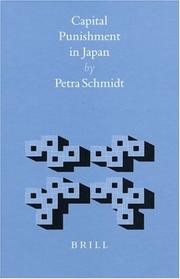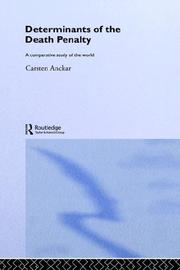| Listing 1 - 10 of 171 | << page >> |
Sort by
|

ISSN: 09256512 ISBN: 9004124217 9789004124219 9789004482999 Year: 2002 Publisher: Leiden; Boston : BRILL
Abstract | Keywords | Export | Availability | Bookmark
 Loading...
Loading...Choose an application
- Reference Manager
- EndNote
- RefWorks (Direct export to RefWorks)
Capital punishment has been carried out in Japan since ancient times. Although ancient Japan uniquely suspended executions for several centuries towards the end of the first millennium, today the death penalty is firmly established in Japan. This volume explores the current state of capital punishment, the domestic discussion on the subject, and the influence of the political orientations of the governments of recent years. The treatise is of current interest especially because of the Aum cult, whose leader Shoko Asahara is at present tried in Tokyo. If found guilty, he may be sentenced to death. After a three years' interval (between 1989 and 1993), Japan is nowadays undergoing a capital punishment "renaissance" with 39 executions between 1993 and 2000.
Capital punishment --- Public opinion --- History --- Death penalty
Book
ISBN: 1283166232 9786613166234 3110248778 Year: 2011 Publisher: Berlin ; Boston : De Gruyter,
Abstract | Keywords | Export | Availability | Bookmark
 Loading...
Loading...Choose an application
- Reference Manager
- EndNote
- RefWorks (Direct export to RefWorks)
Mit Artikel 102 des Grundgesetzes fand nach fast 100 Jahren abolitionistischer Reformbestrebungen die Zulassung der Todesstrafe ihr verfassungsrechtliches Ende. Was waren die Gründe für die überraschende Entscheidung des damaligen Gesetzgebers, entgegen der zu jener Zeit vorherrschenden Volksstimmung zugunsten der Todesstrafe, die höchste Strafe abzuschaffen. Welche Auswirkungen hatte das Verfassungsverbot auf die diese Regelung ablehnende Bevölkerung? Untersucht wird insbesondere die Entwicklung der parlamentarischen und öffentlichen Meinungsbildung in der Zeit von 1949 bis 1990 zur Frage der erneuten Anwendung der Todesstrafe. Denn trotz der eindeutigen Regelung des Artikels 102, die nur mit einer verfassungsändernden Mehrheit in Bundestag und Bundesrat beseitigt werden kann, wurde die Regelung seit Beginn der 50er Jahre bis hinein in die 70er Jahre immer wieder durch Politik, Presse und Öffentlichkeit kontrovers diskutiert. Angeheizt durch teils aufsehenerregende Verbrechen gab es zahlreiche Versuche, die verfassungsrechtliche Entscheidung rückgängig zu machen. Erst in den späten 70er Jahren stellte sich eine stabile Mehrheit gegen die erneute Einführung der Todesstrafe ein. Das ehemals heftig kritisierte Verfassungsverbot hatte sich zu einem von der Mehrheit des Volkes allgemein anerkannten Rechtsgrundsatz entwickelt. Anhand parlamentarischer Debatten, Akten des Bundesjustizministeriums sowie der Auswertung der Tagespresse und demoskopischer Erhebungen versucht die Arbeit Erkenntnisse zu Motivationen und Ansichten zu geben, warum die Politik trotz der fehlenden Übereinstimmung mit der öffentlichen Meinung an ihrer Entscheidung unbeirrt festhielt, die Bevölkerung das Verfassungsverbot erst Jahrzehnte nach seinem Inkrafttreten akzeptierte und diese Entwicklung schließlich dazu führte, dass die Bundesrepublik Deutschland fortan auch über ihr Territorium hinaus für die Ächtung der Todesstrafe eintrat.
Capital punishment --- Death Penalty. --- Federal Republic of Germany.
Book
ISBN: 2130364063 9782130364061 Year: 1980 Volume: 1834 Publisher: Paris : PUF - Presses Universitaires de France,
Abstract | Keywords | Export | Availability | Bookmark
 Loading...
Loading...Choose an application
- Reference Manager
- EndNote
- RefWorks (Direct export to RefWorks)
Criminal law. Criminal procedure --- France --- Capital punishment --- Peine de mort --- Peine --- --Peine de mort --- --343.9 --- #GROL:SEMI-343.9 --- 343.25 --- Désherbage --- Criminologie --(algemeen) --- Deselectie --- Death penalty --- 343.9 --- 343.9 Criminologie --(algemeen) --- Death penalty. --- --Death penalty.
Book
ISBN: 0823282325 Year: 2018 Publisher: New York, NY : Fordham University Press,
Abstract | Keywords | Export | Availability | Bookmark
 Loading...
Loading...Choose an application
- Reference Manager
- EndNote
- RefWorks (Direct export to RefWorks)
Why have generations of philosophers failed or refused to articulate a rigorous challenge to the death penalty, when literature has been rife with death penalty abolitionism for centuries? In this book, Peggy Kamuf explores why any properly philosophical critique of capital punishment in the West must confront the literary as that which exceeds the logical demands of philosophy.Jacques Derrida has written that “the modern history of the institution named literature in Europe over the last three or four centuries is contemporary with and indissociable from a contestation of the death penalty.” How, Kamuf asks, does literature contest the death penalty today, particularly in the United States where it remains the last of its kind in a Western nation that professes to be a democracy? What resources do fiction, narrative, and poetic language supply in the age of the remains of the death penalty?Following a lucid account of Derrida’s approach to the death penalty, Kamuf pursues this question across several literary texts. In reading Orwell’s story “A Hanging,” Kamuf explores the relation between literary narration and the role of the witness, concluding that such a witness needs the seal of literary language in order to account for the secret of the death penalty. The next chapter turns to the American scene with Robert Coover’s 1977 novel The Public Burning, which restages the executions of Julius and Ethel Rosenberg as an outlandish public spectacle in Times Square. Because this fictional device reverses the drive toward secrecy that, beginning in the mid-nineteenth century, put an end to public executions in the West, Kamuf reads the novel in a tension with the current tendency in the U.S. to shore up and protect remaining death penalty practices through increasingly pervasive secrecy measures. A reading of Norman Mailer’s 1979 novel The Executioner’s Song, shows the breakdown of any firm distinction between suicide and capital execution and explores the essential affinity between traditional narrative structure, which is plotted from the end, and the “plot” of a death penalty. Final readings of Kafka, Derrida, and Baudelaire consider the relation between literature and law, showing how performative literary language can “play the law. “A brief conclusion, titled “Postmortem,” reflects on the condition of literature as that which survives the death penalty.A major contribution to the field of law and society, this book makes the case for literature as a space for contesting the death penalty, a case that scholars and activists working across a range of traditions will need to confront.
Charles Baudelaire. --- Derrida. --- George Orwell. --- Norman Mailer. --- Robert Coover. --- death penalty. --- Charles Baudelaire. --- Derrida. --- George Orwell. --- Norman Mailer. --- Robert Coover. --- death penalty.
Book
ISBN: 9780415827393 9781134066711 9781134066780 9781134066858 9781138639546 Year: 2014 Publisher: Abingdon Routledge
Abstract | Keywords | Export | Availability | Bookmark
 Loading...
Loading...Choose an application
- Reference Manager
- EndNote
- RefWorks (Direct export to RefWorks)
Capital punishment --- Abolition of capital punishment --- Death penalty --- Death sentence --- Criminal law --- Punishment --- Executions and executioners
Book
ISBN: 9781409457190 9781315570808 9781317169918 9781317169925 Year: 2014 Publisher: Surrey Ashgate
Abstract | Keywords | Export | Availability | Bookmark
 Loading...
Loading...Choose an application
- Reference Manager
- EndNote
- RefWorks (Direct export to RefWorks)
Capital punishment --- Abolition of capital punishment --- Death penalty --- Death sentence --- Criminal law --- Punishment --- Executions and executioners
Book
ISBN: 0191696323 9780191696329 Year: 2008 Publisher: Oxford : Oxford University Press,
Abstract | Keywords | Export | Availability | Bookmark
 Loading...
Loading...Choose an application
- Reference Manager
- EndNote
- RefWorks (Direct export to RefWorks)
This volume assesses the global status of capital punishment at the start of the new millennium. It explores the changes that have taken place.
Capital punishment. --- Abolition of capital punishment --- Death penalty --- Death sentence --- Criminal law --- Punishment --- Executions and executioners
Book
ISBN: 0195382455 1281998516 9786611998516 0199714029 Year: 2009 Publisher: Oxford ; New York : Oxford University Press,
Abstract | Keywords | Export | Availability | Bookmark
 Loading...
Loading...Choose an application
- Reference Manager
- EndNote
- RefWorks (Direct export to RefWorks)
Part I: Issues and Methods. 1. Asia and the Future of Capital Punishment. 2. Varieties of Capital Punishment in Contemporary Part II: National Profiles. 3. Development without Abolition: Japan in the 21st Century. 4. A Lesson Learned: Capital Punishment in the Philippines. 5. The Vanguard: The Death Penalty and Political Change in South Korea. 6. The Other China: Capital Punishment in Taiwan. 7. The Political Origins of Chinese Death Penalty Exceptionalism. Part III: Lessons and Prospects. 8. Lessons from Asia. 9. The Pace of Change in Asia. Appendix A: Capital Punishment in the Hermit Kingdom
Capital punishment --- Abolition of capital punishment --- Death penalty --- Death sentence --- Criminal law --- Punishment --- Executions and executioners
Book
ISBN: 058521168X 9786610531936 1280531932 019802827X 1423763211 0195349180 1602567425 9781423763215 9781280531934 9780195349184 0197719716 Year: 2023 Publisher: New York : Oxford University Press,
Abstract | Keywords | Export | Availability | Bookmark
 Loading...
Loading...Choose an application
- Reference Manager
- EndNote
- RefWorks (Direct export to RefWorks)
Collecting work by several notable scholars, this book explains why the US still clings to capital punishment long after other democratic nations have abandoned it. It also exhibits a new way of thinking about state killing that goes beyond abstract moral argument and narrow policy debate to assess its impact on our legal system, its powerful symbolic appeal, and its place in today's ""culture wars.""
Capital punishment --- Abolition of capital punishment --- Death penalty --- Death sentence --- Criminal law --- Punishment --- Executions and executioners

ISBN: 1134315465 128004618X 0203314441 9780203314449 9781134315468 9781134315413 1134315414 9781134315451 1134315457 9780415333986 0415333989 9780415860116 0415860113 0415333989 Year: 2004 Publisher: London ; New York : Routledge,
Abstract | Keywords | Export | Availability | Bookmark
 Loading...
Loading...Choose an application
- Reference Manager
- EndNote
- RefWorks (Direct export to RefWorks)
Determinants of the Death Penalty seeks to explain the phenomenon of capital punishment - without recourse to value judgements - by identifying those characteristics common to countries that use the death penalty and those that mark countries which do not. This global study uses statistical analysis to relate the popularity of the death penalty to physical, cultural, social, economical, institutional, actor oriented and historical factors. Separate studies are conducted for democracies and non-democracies and within four regional contexts. The book also contains an in-depth investigat
Capital punishment --- Abolition of capital punishment --- Death penalty --- Death sentence --- Criminal law --- Punishment --- Executions and executioners
| Listing 1 - 10 of 171 | << page >> |
Sort by
|

 Search
Search Feedback
Feedback About
About Help
Help News
News